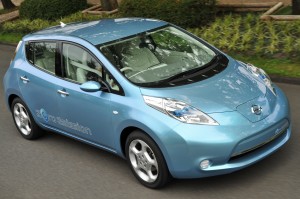
By John Addison (8/3/09). Nissan will be the first to have thousands of affordable freeway-speed electric vehicles on the highways. The new 2010 Nissan LEAF is a comfortable compact hatchback that seats five.
Clean Fleet Report’s test drives of the Nissan EV demonstrated plenty of acceleration. The Nissan LEAF is powered by 24kWh of laminated compact lithium-ion batteries, which generate 90 kW of power, while its electric motor delivers 80kW/280Nm.
Although Tesla will be the first to have a thousand freeway-speed EV on the roads, the $100,000 price tag is out of reach for most of us. According to Nissan, the LEAF will be “competitively priced in the range of a well-equipped C-segment vehicle.” In late 2010, Nissan will finalize pricing and its sale and/or lease strategy. We expect the LEAF to start around $30,000. Buyers are likely to qualify for a $7,500 federal tax credit.
The Nissan LEAF will build on Nissan’s hybrid-electric success with the Altima Hybrid, which is in currently in the #6 position for U.S. cars with the lowest greenhouse gas emissions. The Nissan Altima Hybrid starts at $26,500.
The LEAF has a range of about 100 miles. In 8 hours you are good for another 100 miles with a Level 2 AC200V home-use charger; in 26 minutes you can be 80 percent charged with a Level 3 DC 50kW quick charger. The 440v Level 3 chargers are likely to be scare, expensive, and certainly not for home use.
Nissan did not announce that LEAF batteries can be quickly swapped, but Nissan continues to partner with Better Place.
Many drivers will only spend $20 to $40 per month for electricity – a fraction of what they now spend for gas at the pump. Early adopters of electric vehicles, especially fleets, often use their solar power to charge vehicles.
In 2010, the Nissan will first be available in CA, OR, WA, AZ, TN, and NC.
Nissan is working with a number of global partners to accelerate development of a charging infrastructure, early fleet use, and education. For example, when I recently spoke at a San Diego cleantech event (presentation videos) San Diego Gas and Electric announced early roll-out of 1,000 Nissan LEAF and an extensive charging infrastructure. Clean Fleet Report predicts that Nissan will be the first to have 10,000 freeway-speed electric vehicles on the road.
Toyota, Chevrolet, Chrysler and others will compete with Nissan by offering plug-in hybrids which will go up to 40 miles in battery electric mode and then engage gasoline engines to provide hundreds of miles of added range until the next gasoline fill-up or electric charge.
Nissan, however, is focused on zero-emission leadership. Longer term, Nissan expects to see many urban centers, such as London, where only ZEV will be exempt from expensive daily congestion fees. The 100-mile range meets the needs of 90 percent of U.S. daily driving and meets the needs of households with two or more cars.
Nissan will also face battery-electric competition next year from Ford, Chrysler, Mercedes Smart, and dozens of emerging innovators. Electric vehicles are not new to the United States. 40,000 now drive light electric-vehicles on corporate and college campuses, typically with 25 mph speeds and 25 mile ranges.
Nissan LEAF employs an exclusive advanced IT system. Connected to a global data center, the system can provide support, information, and entertainment for drivers 24 hours a day. The dash-mounted monitor displays Nissan LEAF’s remaining power – or “reachable area” – in addition to showing a selection of nearby charging stations. Another state-of-the-art feature is the ability to use mobile phones to turn on air-conditioning and set charging functions – even when Nissan LEAF is powered down. An on-board remote-controlled timer can also be pre-programmed to recharge batteries.
The LEAF has a distinctive aerodynamic design. The “blue earth” color theme of the Aqua Globe body color of Nissan LEAF’s introductory model compliments the blue dashboard and instrumentation.
The first of Nissan’s EV’s will be manufactured at Oppama, Japan, with additional capacity planned for Smyrna, Tennessee, USA. Meanwhile, lithium-ion batteries are being produced in Zama, Japan, by the Nissan-NEC JV with additional capacity planned for the USA, the UK and Portugal, and other locations.
Nissan’s leadership will accelerate the manufacturing of fully-functional electric vehicles in volume. Manufacturing volume will drive down cost, making zero-emission vehicles cost competitive with gasoline counterparts. Electric vehicles will likely be less expensive for people to drive with low-cost nighttime charging. It will be easy for people to save on emissions when they are saving money at the same time.
